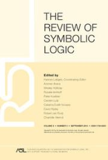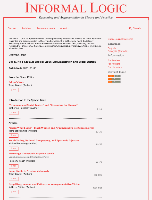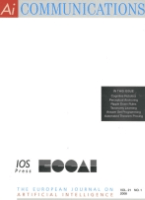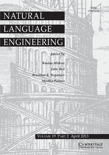
Argument & Computation
Scope & Guideline
Unveiling New Dimensions in Argument and Computation
Introduction
Aims and Scopes
- Formal Argumentation Models:
The journal publishes research on the development and analysis of formal models of argumentation, exploring various semantics, frameworks, and methodologies for representing and reasoning about arguments. - Computational Approaches to Argumentation:
This area encompasses studies that apply computational techniques to argumentation, including algorithms for learning argumentation frameworks, analyzing argument strength, and developing AI systems that engage in argumentative dialogue. - Interdisciplinary Applications:
Research often explores the application of argumentation theory across disciplines, such as law, healthcare, and ethics, fostering collaboration between computer science, philosophy, and social sciences. - Ethics and Argumentation:
The journal highlights the role of ethical considerations in argumentation, examining how arguments are constructed and evaluated in contexts like healthcare, environmental policy, and AI ethics. - Dialogue and Interaction in Argumentation:
This focus area includes studies on argumentation in dialogue systems, exploring how agents can engage in persuasive and strategic argumentation to achieve specific goals.
Trending and Emerging
- Ethical Argumentation in AI:
There is a growing focus on the ethical implications of argumentation in AI systems, exploring how AI-generated arguments can be assessed for quality and moral considerations, which is crucial in the context of increasing reliance on AI in decision-making. - Learning from Argumentation Data:
The trend of using machine learning techniques to analyze and learn from argumentation data is on the rise, indicating a shift towards data-driven approaches that can enhance the understanding of argument dynamics and effectiveness. - Argumentation in Legal Contexts:
Research exploring argumentation frameworks within legal reasoning is becoming more prominent, reflecting the need for robust models that can handle complex legal scenarios and improve legal decision-making processes. - Explainable AI and Argumentation:
There is an increasing interest in the intersection of explainable AI and argumentation, focusing on how argumentation can contribute to transparency and accountability in AI systems, particularly in high-stakes applications. - Community Detection in Argumentation:
Emerging studies on community detection through argument similarity indicate a trend towards understanding how arguments are formed and perceived within social networks and online debates, highlighting the relevance of argumentation in digital communication.
Declining or Waning
- Classic Argumentation Schemes:
Research centered on traditional argumentation schemes has seen a decrease, possibly due to the emergence of more sophisticated models and frameworks that incorporate dynamic and computational elements. - Historical and Philosophical Foundations:
Although foundational theories remain important, there is less emphasis on purely historical or philosophical discussions of argumentation, as the journal increasingly prioritizes empirical and computational studies. - Generalized Argumentation Frameworks:
There appears to be a waning interest in generalized frameworks that do not incorporate specific applications or computational methods, as researchers are gravitating towards more specialized and practical implementations.
Similar Journals

Reports on Mathematical Logic
Unraveling the Complexities of Mathematical ReasoningReports on Mathematical Logic is an esteemed academic journal published by Jagiellonian University’s Theoretical Computer Science Department in Poland. Focusing on the interdisciplinary realms of logic and philosophy, this journal publishes rigorous research articles that explore the foundational aspects and implications of mathematical logic in various contexts. Although it currently maintains an open access model, the journal's impact can be seen through its categorized rankings, with a Q4 in Logic and a commendable Q2 in Philosophy as of 2023. This positions it as a valuable resource for academics seeking to engage with innovative ideas and methodologies in the field. Additionally, the journal has a historical academic presence, having converged in its publication years from 2011 to 2014 and again from 2016 to 2023, underscoring its ongoing commitment to advancing knowledge in logic. With a focus on contemporary research, Reports on Mathematical Logic is essential for researchers, professionals, and students aiming to stay at the forefront of logic studies.

Review of Symbolic Logic
Elevating Discourse in Symbolic AnalysisReview of Symbolic Logic is a prestigious academic journal published by Cambridge University Press, dedicated to advancing the field of logic through critical analysis and innovative research. Established in 2008, the journal has become a key fixture in the academic community, particularly recognized for its contributions in the realms of logic, mathematics (miscellaneous), and philosophy. With an impressive classification of Q1 across multiple categories in 2023, it ranks within the top echelons of its field, standing at 15th out of 41 in Logic and 29th out of 90 in miscellaneous mathematics, positioning itself as essential reading for scholars and practitioners alike. Although not Open Access, the journal offers robust access options through institutional subscriptions, providing an expansive platform for the dissemination of high-quality research. Review of Symbolic Logic aims to foster a deeper understanding of symbolic logic's applications and implications while inspiring emerging scholars and seasoned researchers to further the dialogue within this vibrant area of study.

JOURNAL OF AUTOMATED REASONING
Advancing the Frontiers of Automated ReasoningJOURNAL OF AUTOMATED REASONING is a premier academic journal published by SPRINGER, focusing on the dynamic and evolving fields of Artificial Intelligence, Computational Theory and Mathematics, and Software. With an ISSN of 0168-7433 and E-ISSN 1573-0670, this journal ranks impressively in the second quartile (Q2) across multiple categories, reflecting its significant contribution to the advancement of knowledge in automated reasoning methodologies. Since its inception in 1985, it has served as a vital platform for researchers and professionals to share groundbreaking findings and innovative techniques, facilitating the exploration of algorithms, logical frameworks, and reasoning processes that underpin artificial intelligence systems. Although it does not currently offer Open Access options, it remains a highly regarded resource, cited widely in academia, with its impactful publications reflecting deep insights and rigorous scholarly standards. The journal’s esteemed status and its ongoing commitment to fostering a greater understanding of automated reasoning make it an invaluable asset for those dedicated to pushing the boundaries of these interdisciplinary fields.

INTERNATIONAL JOURNAL OF APPROXIMATE REASONING
Unraveling Complexities in Theoretical Computer ScienceThe INTERNATIONAL JOURNAL OF APPROXIMATE REASONING, published by Elsevier Science Inc, stands as a pivotal resource in the domains of applied mathematics and artificial intelligence. Since its inception in 1987, the journal has evolved into a leader in its field, boasting an impressive impact factor and ranking within the top quartile for applied mathematics (Q1) and high standings in artificial intelligence and software categories according to the 2023 Scopus rankings. As researchers, professionals, and students delve into complex issues surrounding reasoning under uncertainty, this journal provides invaluable insights and cutting-edge research. In addition to its rich content, the journal's commitment to advancing knowledge in theoretical computer science further enhances its significance in fostering academic growth. While the journal does not currently offer open access, its rigorous peer-review process ensures that only high-quality, impactful studies are published, solidifying its role as an essential source for academics striving to remain at the forefront of their fields.

BIOLOGY & PHILOSOPHY
Bridging Disciplines to Illuminate Biological UnderstandingBIOLOGY & PHILOSOPHY, published by SPRINGER, is a leading journal that explores the intricate and dynamic interplay between biology and philosophy. With an impressive impact factor in the Q1 category across multiple disciplines including Agricultural and Biological Sciences, History and Philosophy of Science, and Philosophy, this journal has firmly established itself as an essential resource for researchers, professionals, and students alike. Since its inception in 1986 and continuing through 2024, BIOLOGY & PHILOSOPHY fosters critical inquiry and discussion, inviting contributions that advance the understanding of biological sciences from philosophical perspectives. Although it operates under a traditional subscription model without Open Access options, its high Scopus rankings—#38 in Philosophy and #14 in History and Philosophy of Science—underscore its significance and influence in contemporary research. For those keen on delving deeper into the ethical, epistemological, and conceptual challenges posed by biological research, this journal serves as a compelling platform for groundbreaking scholarship.

Informal Logic
Innovating Scholarship at the Intersection of Logic and PhilosophyInformal Logic is a prestigious, open-access academic journal published by the University of Windsor's Department of Philosophy, focusing on the intersection of reasoning, argumentation, and rhetoric within the field of philosophy. Since its establishment in 2006, it has dedicated itself to promoting rigorous scholarship and innovative methodologies, supporting an array of topics that delve into both theoretical and practical dimensions of informal logic. With an impressive Q1 ranking in philosophy as of 2023, and a commendable ranking of #149 out of 806 within the Arts and Humanities - Philosophy category, the journal holds a significant place in academic discourse, attracting a diverse readership of researchers, professionals, and students alike. Notably, it operates under an open-access model, fostering greater accessibility to high-quality research, and contributing to the growing global dialogue around critical thinking and communication. The journal’s impact and relevance continue to grow, especially in the context of converging years from 2010 to 2024, making it an essential resource for anyone engaged in the study of informal logic.

AI COMMUNICATIONS
Exploring the Frontiers of Artificial Intelligence Communication.AI COMMUNICATIONS is a distinguished journal published by IOS PRESS, focusing on the dynamic field of Artificial Intelligence. With a rich history dating back to 1987, this journal covers a broad spectrum of topics, including the latest advancements in AI methodologies, applications, and implications for society. Despite holding a Q3 classification in the 2023 category of Artificial Intelligence, it provides an essential platform for dialogue and dissemination of research, highlighted by its global accessibility in the realm of AI communications. Researchers, professionals, and students alike will find a wealth of knowledge within its pages, which aim to bridge the gap between cutting-edge research and practical applications in AI. By contributing to this journal, authors have the potential to engage with a diverse audience and impact the ongoing discourse surrounding artificial intelligence technologies.

Natural Language Engineering
Connecting Theory and Practice in NLPNatural Language Engineering is a premier journal published by Cambridge University Press, dedicated to advancing the field of artificial intelligence and its intersection with linguistics and software. Since its inaugural publication in 1995, the journal has established itself as a vital platform for innovative research and development in natural language processing (NLP) and engineering. With a notable impact factor reflecting its influential contributions, it ranks in the top tiers across various categories, including Q1 in Linguistics and Language and Q3 in Artificial Intelligence. Researchers and practitioners alike benefit from the opportunity to access insightful articles that address both theoretical aspects and practical applications of NLP technologies. Although it operates under a traditional subscription model, the rigorous peer-review process ensures high-quality publications that foster academic discourse and collaboration within the community. This journal is essential for anyone interested in the evolving landscape of language engineering, making it a cornerstone reference for upcoming scholars and seasoned professionals aiming to push the boundaries of knowledge in this dynamic field.

Revista de Estudos Constitucionais Hermeneutica e Teoria do Direito-RECHTD
Fostering Dialogue in Legal StudiesRevista de Estudos Constitucionais Hermeneutica e Teoria do Direito-RECHTD is a distinguished academic journal published by UNIV VALE DORIO SINOS (UNISINOS), focusing on the realms of constitutional studies, hermeneutics, and legal theory. Since its inception as an Open Access publication in 2009, it has provided a platform for rigorous scholarly discourse and innovative research in the legal field, particularly within the Brazilian context. With its E-ISSN 2175-2168, this journal aims to foster a deeper understanding of the constitutional framework and its implications in contemporary society. Despite its recent Q4 ranking in the Law category, RECHTD offers valuable insights and developments, making it a crucial resource for researchers, professionals, and students interested in legal studies, especially those investigating the nuances of hermeneutics and theory of law. Its impact on the academic community is set to grow as it continues to bridge gaps in legal scholarship and promote informed dialogue.

Doxa-Cuadernos de Filosofia y Derecho
Championing Open Access for Innovative Philosophical and Legal ResearchDoxa-Cuadernos de Filosofia y Derecho, an esteemed journal published by Universidad de Alicante, serves as a vital platform for scholarly discourse in the fields of philosophy and law. Established with the intention of fostering an interdisciplinary understanding, the journal is indexed with an impressive Q1 ranking in Philosophy and a Q2 ranking in Law for 2023. With its Open Access policy implemented since 2016, Doxa ensures that cutting-edge research is freely accessible, promoting wider dissemination of ideas and encouraging academic collaboration. Housed in the picturesque city of Alicante, Spain, Doxa celebrates a converged publishing timeline from 2019 to 2023, reflecting its commitment to contemporary issues and dialogues within both disciplines. As a vital resource for researchers, professionals, and students, this journal invites contributions that push the boundaries of philosophical inquiry and legal scholarship.